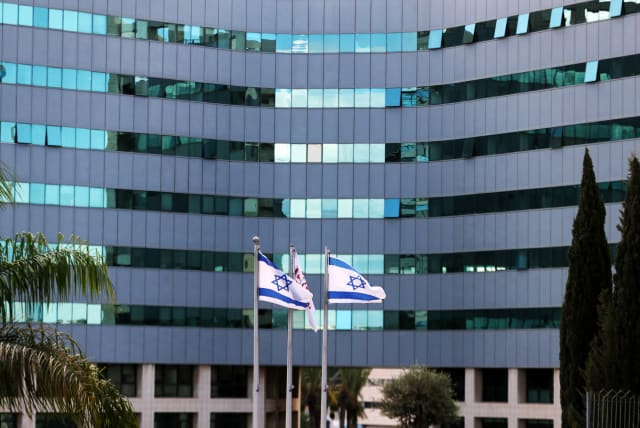Is a start-up boom on the horizon for Israel?

Israel’s entrepreneurs and inventors are still delivering under these nonoptimal circumstances.
Israel could see a “start-up boom” following the Israel-Hamas war, according to Dror Bin, CEO of the Israel Innovation Authority (IIA).
“Periods of difficulty are actually very good periods in terms of creating new successful ventures,” Bin told The Jerusalem Post. “Most of the most successful ventures were created during times of downturn.”
He said that the fact that many Israelis were called out of their comfort zones, whether through military service or participation in volunteer initiatives, exposed them to new experiences and interactions, which can spark innovation.
Nonetheless, the IIA isn’t taking any chances. Since October 7, the authority has put many programs in place to help support Israel’s start-up community and plan for the “day after” – when reservists return home with all these ideas and want to develop them.
The first phase was what Bin described as “first aid.” The authority launched its Fast Track Fund three weeks after the war broke out. This fund was meant to ensure that good early-stage companies in Israel with short runways [i.e., with only a limited number of months in which they can operate by using their cash reserves] would not go under because of the war.
“We realized very quickly that almost half of the early-stage companies in Israel had runways of less than six months, and that the investors were hesitating to conclude financing rounds because of the war,” Bin explained.
The $100 million fund, of which $90m. has already been allocated, injected money into those start-ups to ensure they could continue operations until after the war, when they can go out for a “calm financing round.” For now, it looks like it was a successful program, according to Bin.
Yet, it became evident that a mere first-aid fund wouldn’t suffice, given the scale of the crisis: hundreds of thousands called up for reserve duty, millions allocated to war efforts instead of innovation, and widespread global reluctance to support Israel.
At the same time, there is a global downturn in investments in start-ups in general.
“We wanted to ensure that we were not entering a period of freezing investments, and this is why we launched two new major initiatives,” Bin explained: The YOZMA Fund and the Revolutionary Startup Fund, a deep-tech start-up fund.
What are the purposes of the funds?
The first fund is to ensure that Israeli venture funds have enough money to continue investing in early-stage start-ups, and to create new investment venues for Israeli institutional investors in Israeli venture funds. Until now, Bin said, they were investing but in a low magnitude.
“The way it’s going to work is that for every dollar that an Israeli institutional investor will put into a venture fund, we will add 30 cents if the fund is successful,” Bin explained. “The institutional investor can pay us back and take all the upside for himself, so it’s like an ‘upside booster.’”
If the venture fund does not grow, the IIA will retain its position and take part in the loss with the institutional investor.
“The idea is to inject within 2024 and 2025 around $1 billion into early-stage venture funds, out of which about one quarter is government money,” Bin said.
The concept for the deep-tech start-up fund was developed before October 7, but, according to Bin, now is the “optimal time” to launch it.
“When we look at the future, we see that many of humanity’s challenges are related not only to software but to tangible products and deeper technology,” Bin explained. “If you think about climate change and the necessary climate tech; if you think about how to provide healthcare services to a growing aging population on the planet; if you think about food security – all of these require more than software. They’ll need deeper technologies with higher risk, longer time to market, and more stringent regulations.
“These are the types of ventures we want to see more coming out of Israel, to secure the long-term growth of the Israeli hi-tech sector,” Bin added.
Applications for the Revolutionary Startup Fund will begin next month. The IIA has already budgeted it at $100m. for this year.
It sounds like a high price tag for innovation at a time when Israel is spending billions fighting Hamas and is engaged in a war with no end in sight. However, Bin said the war is precisely why the country is investing more in hi-tech.
He said Israeli hi-tech is integral to the country’s economy as a whole, and that Israel can’t afford to wait and react only when problems arise. He highlighted that Israeli tech constitutes approximately one-fifth of the nation’s GDP, a significantly higher proportion than the US and nearly quadruple that of the European Union.
“We cannot risk any slowdown or downturn in the Israeli hi-tech sector,” Bin stressed. “There was a 2024 budget discussion in the government a few weeks ago, and all the government ministries were cut down significantly. Only the Defense Ministry and the Israel Innovation Authority received higher budgets.
“The government fully understands how hi-tech is part of Israel’s national security.”
Bin admitted that in Israel, like in much of the Western world, there has been a significant drop in the number of start-ups created yearly – only half as many today as 10 years ago. Around 600 new Israeli start-ups are being opened annually.
“We don’t want to see a further drop, and this is also why we are launching those new funds, to make sure that the funding environment in Israel for early-stage start-ups is optimal,” Bin said, “and to make sure that any entrepreneur who wants to start a start-up will not be afraid of the fact that he or she cannot get enough funding.”
BIN SAID he remains confident in the Israeli hi-tech ecosystem for several reasons, including that Israeli companies raised more than $1.5b. in Q4 – the first three months after the war broke out – a significant amount of money for a country amid a security crisis.
Second, the fundamentals of Israeli hi-tech did not change because Hamas murdered 1,200 people.
“We still have amazing entrepreneurs, great researchers in academia, a very sophisticated investor community, and those continue to work,” Bin said.
The CEO was recently on a road show with investors in the States, and said the response was “very positive.”
“First of all, mostly, there is an understanding that this is a war we need to win,” Bin said. “Secondly, they see the amazing start-ups coming out of Israel and want to continue investing in Israel.”
Finally, Israel’s entrepreneurs and inventors are still delivering under these nonoptimal circumstances.
“They are very focused on their work; they know that they cannot lose sight of the global competition, and they are working with their customers, investors, and partners abroad [as they always have],” Bin said. “They deliver on older commitments to make sure that they’re not falling behind the competition. This is why the slogan ‘Israeli tech delivers, no matter what’ was born.
“Like in previous crises that we had in the last few decades, whether there were security crises, global macroeconomic crises, or even coronavirus – the hi-tech community rose stronger,” Bin concluded. “I hope and believe this will also be the case this time.”
Jerusalem Post Store
`; document.getElementById("linkPremium").innerHTML = cont; var divWithLink = document.getElementById("premium-link"); if (divWithLink !== null && divWithLink !== 'undefined') { divWithLink.style.border = "solid 1px #cb0f3e"; divWithLink.style.textAlign = "center"; divWithLink.style.marginBottom = "15px"; divWithLink.style.marginTop = "15px"; divWithLink.style.width = "100%"; divWithLink.style.backgroundColor = "#122952"; divWithLink.style.color = "#ffffff"; divWithLink.style.lineHeight = "1.5"; } } (function (v, i) { });


